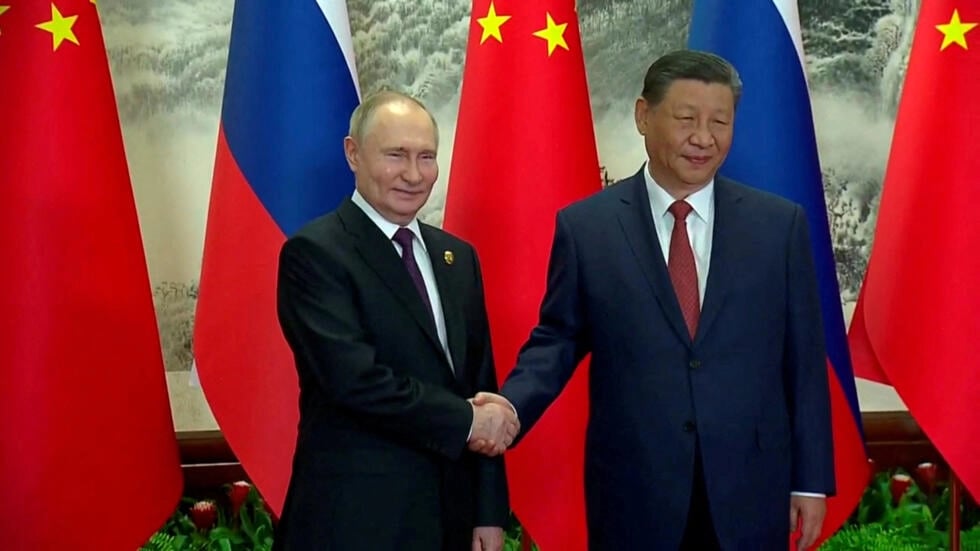
The United States is “profoundly concerned” over China’s “feeding Russia’s war machine” to bolster its forces in Ukraine, while Beijing is also professing it wants better trade relations with the West, the State Department’s top official for East Asia and the Indo-Pacific said last week.
Daniel Kritenbrink, assistant secretary of state for east asian and pacific affairs, said, “China can’t have it both ways.” He added Beijing’s “reconstituting Russia’s defense industrial base” is having an effect that could grow on the battlefield. Russian President Vladimir Putin is scheduled to meet Chinese leader Xi Jin-ping in Beijing this week to discuss energy, security and further their 2022 agreement on “no limits” cooperation. That agreement was reached shortly before the Ukraine invasion.
From the start, Kritenbrink said, Beijing and Moscow have expressed their intention to dominate their “near-adjacent region” and jointly act to counterbalance U.S. global presence.
In the Indo-Pacific, he added, you can see the security aspects of the agreement in joint Chinese-Russian maritime patrols and air operations near Japan. In addition, China, Russia and Iran completed naval drills in the Gulf of Oman in mid-March. Tehran has been supplying Moscow with unmanned aerial systems to replace losses in the Ukrainian war. China’s role in the war most often has been described as providing dual-use technologies critical to Russia’s industrial base in view of trade sanctions imposed by the U.S., European Union and other Ukrainian supporters
Kritenbrink said Washington is “focused on maintaining peace and stability in the Taiwan Strait” as China has increased its number of “combat [air] patrols” near the island and upped economic pressure on Taipei to accept Beijing’s control. The new moves come as the self-governing democracy will inaugurate a new president, Lai Ching-te, later this month.
“Nobody wants a crisis; nobody wants a conflict” over Taiwan or in the South China Sea, he said.
When asked about Beijing’s criticism of the developing Quad relationship among the United States, Japan, India and Australia, he termed it “outrageous and completely off-base.” Kritenbrink said the four “have an affirmative agenda” for the Indo-Pacific, ranging from major health affairs initiatives begun during the COVID-19 pandemic to helping nations build their own maritime awareness capabilities and building telecommunications networks, including the laying of undersea cable.
The Quad is “in convergence with ASEAN” on its objectives for the Indo-Pacific of resolving disputes peacefully and fostering regional development. The Association of South East Asian Nations (ASEAN) is comprised of 10 nations; China and the United States are its largest trading partners.
The United States thinks of China “primarily in competitive terms” and wants “engagement and a responsible relationship.” When questioned about the Biden administration’s new tariffs on electric vehicles, solar panels and other goods, he said the steps were taken to “address unfair China trade practices,” which include theft of intellectual property and selling goods below-cost to gain market share.
On relations with North Korea and security in Northeast Asia, Kritenbrink said, “we’re open to diplomacy without conditions,” but Pyongyang’s answer has been more missile launches. It has caused Washington, Seoul and Tokyo “to double-down” on buttressing their trilateral security relationship of exchanging intelligence and exercising together. He added the United States has reaffirmed its commitment to both allies that it will come to their defense if attacked.
“We’ve been left with little choice,” he added.
To back up diplomatic work, “we have to flow real resources into the [Indo-Pacific].” He called the arrangements Washington has with Japan, India, South Korea, Australia, New Zealand, Indonesia and others “a lattice work.” He cited the Blue Pacific initiative, which was created in 2022, among the United States, United Kingdom, Japan, Australia and New Zealand, and the Quad as working toward the same developmental goals.
Using the Pacific Island nations as an example, Kritenbrink said the United States has brought the Peace Corps back to help in education, sent Coast Guard mobile training teams to assist in maritime domain awareness to curb illegal fishing and reestablished the presence of USAID to join other “allies, partners and friends” in investing in their needed infrastructure.
He added the United States has also hosted two Pacific Island nations’ summits since the Bident administration took office in 2021.





